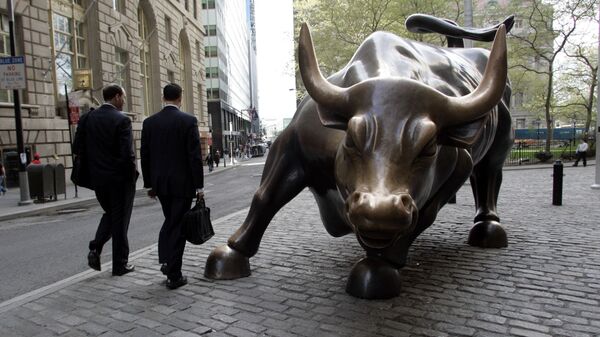US stock futures continued to rise on 26 December amid post-Christmas trading. Citing Bespoke Investment Group, CNBC admitted Thursday that the S&P 500, that measures the stock performance of America's 500 large-cap companies, has returned over 50 percent since Donald Trump was elected.
2019 HOLIDAY RETAIL SALES WERE UP 3.4% FROM LAST YEAR, THE BIGGEST NUMBER IN U.S. HISTORY. CONGRATULATIONS AMERICA!
— Donald J. Trump (@realDonaldTrump) December 25, 2019
According to the media outlet, the bellwether index – a leading indicator of the direction of the economy – has secured over 28 percent in 2019 this year, "well above the average 12.8% return of year three for past US presidents".
Other indices have also grown considerably: "Nasdaq up 72.2 percent since our great 2016 election victory! Dow up 55.8 percent. The best is yet to come!" the US president tweeted on 24 December.
While Markets Show Optimism, Economists Voice Concerns
Trump does not deserve all the credit for the rise, according to Nicola Borri, an economics and finance professor at Rome's LUISS Guido Carli University: in fact, the US stock market has been growing at an unprecedented pace since the end of the global financial crisis of 2007-2008.
"The stock market started to rise under President Obama, and continued to rise under President Trump", he underscores.
At the same time, "most economists are worried about the policies put forward by the Trump administration, especially those related to trade policies", Borri points out, in an apparent reference to the US-China trade war that has repeatedly cast a chill over global markets.
The Sino-American trade war has been raging on since spring 2018, accompanied by temporary truces and tough negotiations. In mid-December, Washington and Beijing reached a consensus on the terms of a "phase one" trade deal. The agreement envisages the cancellation of some new tariffs and reduction of some old ones on Chinese imports in return for increased purchases of American farm, energy, and manufactured goods by China, as well as settling some intellectual property problems.
Although stocks are continuing to go higher, Borri does not rule out a possible collapse of trade talks, which could have serious negative effects on the world economy.
"How to reconcile the negative view by economists, with the optimism of stock markets?" the academic asks. "The answer is in the fact that high stock market returns compensate investors for risk. Investors betting in the stock market, especially under the Trump administration, are exposed to many risks".
As he explains, "whenever news arrives that these risks do not materialise, like when Trump finds an agreement with China, then investors reap the fruits of their bets".
Borri believes that "the unprecedented stock market growth, at least in part, reflects the high level of risk of the world economy", which is not limited to the US-China trade wars, but also includes tensions in the Middle East, climate change, etc.
"These are all sources of major risk for the world economy and they are likely to be with us for the next years, and possibly more", he emphasises.
Meanwhile, some economic observers predict a further rise despite the aforementioned risks: as Market Watch suggested on Monday, emerging markets are likely to get more attractive, US stocks to go higher, and President Donald Trump to be re-elected, while the US economy is catching the wind in its sails.




